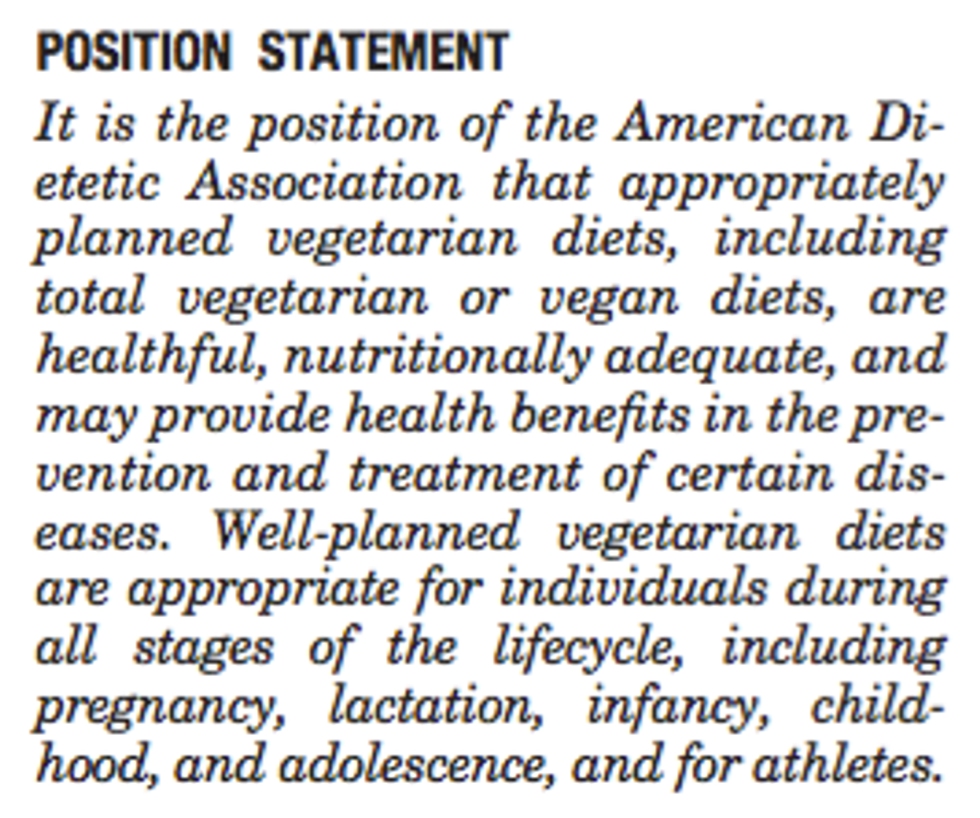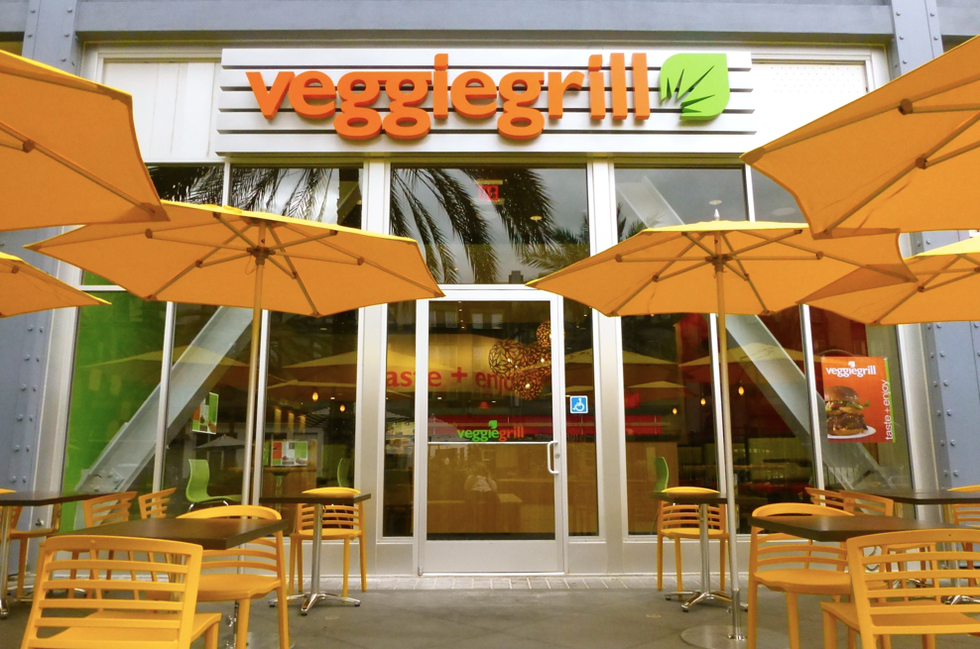So every vegetarian or vegan you've asked has done nothing but get angry at you, and now you're still left needing answers. I get it. On behalf of all of us, I'm sorry that we can occasionally come across as defensive. I want to give you answers to some of the burning questions we as vegans/vegetarians hear every day of our lives. You can leave educated on a new lifestyle, and we can leave with peace of mind that you finally have all of those questions answered already. It's really a win win, and who knows, maybe you (meat eater or otherwise) can help kill the rumors too.
1. We don't get any protein.
Let's start with the big one. We know that protein undoubtedly is one of the most important parts of a human diet, but what is protein? How much of it do our bodies need? Where can we get it?
Protein is made up of what we call amino acids, which also make up things like our muscles and hair. These amino acids arrange to form different types of proteins, and while our body can naturally produce many of them, there are 10 known as "essential" amino acids that we can only obtain through our diet. So, yes, protein through our diet is extremely important. However, these needs can be met through many other choices besides meat (animal protein). 10 seems to be a magic number when it comes to protein, because to meet the needs for these 10 essential amino acids, only 10 percent of our caloric intake needs to be protein! The general rule of thumb is .8 grams of protein for every 2.2 pounds of body weight. Meat eaters generally receive much more than this, but (get ready) so do vegetarians and vegans!
As previously mentioned, there are many different types of protein. We can receive essential proteins through animal protein (although most vegetarians/vegans would like to point out that excess animal protein has been linked to several types of cancers, and let's not get started about the cholesterol). We can also get protein through many plant based foods, which is an amazing way to get all the necessary protein with significantly less of the "bad stuff" (i.e artery clogging cholesterol). Most are aware that beans and nuts have protein, but are we limited to only these foods to ensure our protein needs are met? The answer is absolutely not. The produce aisle contains more protein than you might think, because produce such as broccoli, potatoes, bananas, and so much more provide essential amino acids. Meat alternatives such as tofu, tempeh, and seitan are tasty ways to mimic what people like about meat without paying the price. Eating plant protein ensures much bigger portions, much less fear of what's expired, undercooked, etc., and much more nutrients that we actually need a lot of. To be honest, what we need to be focusing on are fiber and carbs, as our brains and overall bodies rely on those for much more of their operation, but that's a fairly easy issue to research if you're interested.
2. We're forced to take supplements to get all of our nutrients.
OK, the protein stuff is starting to make sense. But doesn't meat provide other things? Like iron? And you have to have dairy to get calcium right? So supplements must be required.
I'm not going to tell you that supplements aren't a good idea. Honestly, vegans and non vegans alike, we could all benefit from taking some sort of supplement considering our foods are becoming less and less nutrient dense due to changes in soil and the pollution of our water. The benefits of supplements are not to provide vegetarians or vegans with iron or calcium, however. We're going to really break both of these down, since they seem to be two that most people are concerned about right underneath protein:
Let's talk iron. We need iron because it's a really important part of hemoglobin, which is responsible for carrying oxygen in the blood. Clearly a big deal. There are two types of iron that we can get through food: heme and non-heme. Non-heme iron is the type of iron that makes up all of plant based iron, and admittedly is not as well absorbed in the human body as heme iron. But (here's the kicker) 60 percent (that's the majority, folks) of the iron found in animal tissue is also non-heme iron, so also not as well absorbed in the human body. Meat eaters are receiving some heme iron in their diet, but the truth is that the majority of their iron is the same iron we eat in a plant based diet. All of this to say: anyone can have an iron deficiency. The abundance or lack of iron in our bodies actually has very little to do with how much iron we receive, because it has so much to do with what we're doing to help our bodies absorb what we're receiving. One of the ways to help your body absorb non-heme iron is to consume more vitamin C, which is generally plentiful in a vegetarian diet and can increase non-heme absorption up to six times the usual amount. A lot of vegetables that are high in iron are luckily also high in vitamin C, like broccoli and bok choy. All of us have the potential to be iron deficient, and studies have shown that iron deficiency is no more common in non-meat eaters than in meat eaters.
Calcium is a little simpler of a topic. It's extremely important and is needed for strong bones, blood clotting, muscle function, and more. I'm sure you've heard all your life that dairy is the source for all your calcium needs, but the truth is pretty simple: dairy is not the end all be all of calcium supply. Calcium is extremely abundant in not only fortified soy milk and juices, but also broccoli (broccoli is just turning out to be the answer for everything isn't it?), tofu, cabbage, okra, etc. Four ounces of tofu has just as much or more calcium as one cup of cow's milk. So, now we know that iron and calcium can both be found and absorbed well in a vegetarian or vegan diet. Supplements for things such as B12 are definitely a personal choice that would be beneficial for meat eaters and non-meat eaters alike! It can be hard to get some of those vitamins in any diet, and nobody ever said a daily vitamin would hurt.
P.S. At this point we now know that vegetarians or vegans are capable of getting the right nutrients, so the common myth that we have less energy due to our diet can be killed too.
3. We're killing the environment by eating all of the plants.
All of the plants are getting consumed by us, so they're all getting destroyed. Isn't this a problem? How can we help the planet?
This one honestly has zero truth to it whatsoever. I wish I could take it and argue both sides for you, but the facts are just too clear. Thirty percent of earth's land mass is being used to raise animals for food. This is a percentage that is constantly rising, and with this rise comes mass amounts of deforestation and water pollution. Even the land used for growing things such as grain is being used for the meat industry. As if giving up that first 30 percent wasn't enough, 70 percent of the grain grown in the United States is fed to farmed animals. I'm sure you can imagine the number of people in need we could be feeding with that. There are plenty of more statistics about who's actually using all of these plants, but I'm sure you get the idea.
Aside from the sheer amount of deforestation, species extinction, etc. caused by the meat 
4. Our diet is expensive.
Having to purchase soy milk or other alternatives is more expensive than eating meat, right? Plus the salads at fast food restaurants are never on the dollar menu.
We're going to keep this one short, because I feel like this can be easily understood. Veganism is actually the cheapest diet when compared to vegetarianism, pescatarianism, or eating meat. Foods such as tofu, beans, rice, and pasta are much more affordable than buying beef or chicken. Saving money in this way may give us a little more spending room should we choose to buy some of the more expensive options such as soy or coconut milk. Those options, by the way, aren't even crucial to the vegetarian or vegan diet - just typically appreciated.
5. Vegetarian or vegan diets only work if you live in an urban area.
Okay, this one is a little more understandable, as it is easier to live a vegetarian/vegan lifestyle in an urban area - when it comes to eating out. These areas typically have restaurants with more meatless options, making going out to eat a little easier on us.
The more rural the area, the more salad we order when we go out. However, no matter where we live, we have access to a variety of tasty and unique recipes that are both fun and healthy to make at home. (Making your own food will generally be more affordable anyway)! I live in south Georgia, so eating out can sometimes be monotonous, but a plus side is that I live in an area with a lot of organic agriculture. I have access to a weekly fresh farmer's market where I can purchase fresh locally grown fruits, vegetables, etc. Also, the produce section of a grocery store anywhere will provide you with the nutrients that matter (as we learned at the beginning). The vegetarian/vegan diet is 100 percent possible and beneficial regardless of where one lives.
The list of myths about vegetarianism/veganism goes on forever, and I could honestly probably fill a book or two with more explanations. However, my hope is that meat eater or not, this article brought some clarity for you about a lifestyle that is ever-growing in popularity. Let's all work together to keep educating ourselves and others about what may or may not be true about the lifestyles of others. The world will truly become a better place if we all make an effort to understand and be understood.










 Energetic dance performance under the spotlight.
Energetic dance performance under the spotlight. Taylor Swift in a purple coat, captivating the crowd on stage.
Taylor Swift in a purple coat, captivating the crowd on stage. Taylor Swift shines on stage in a sparkling outfit and boots.
Taylor Swift shines on stage in a sparkling outfit and boots. Taylor Swift and Phoebe Bridgers sharing a joyful duet on stage.
Taylor Swift and Phoebe Bridgers sharing a joyful duet on stage.













